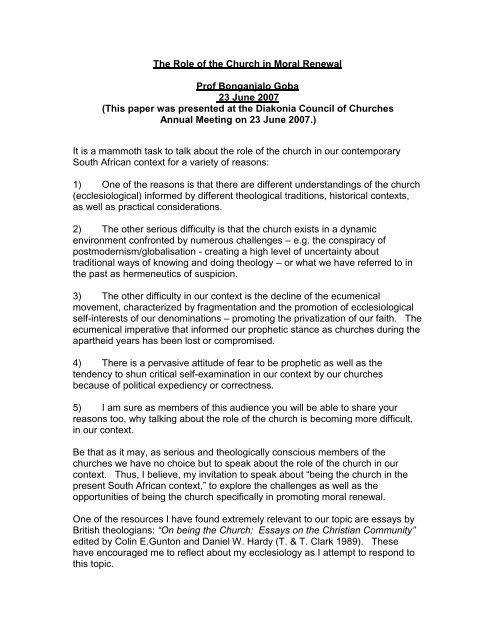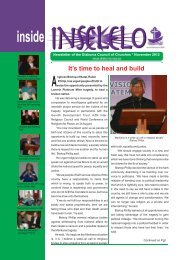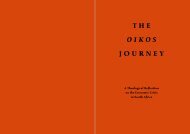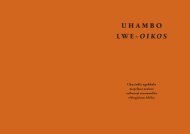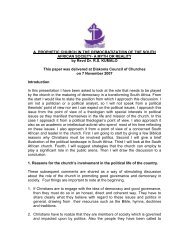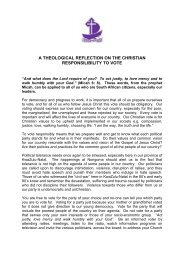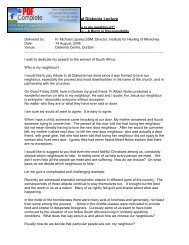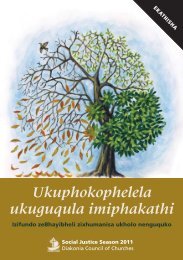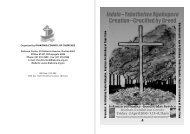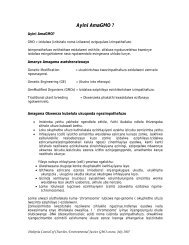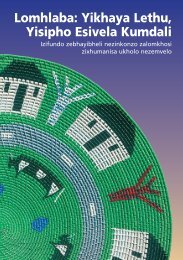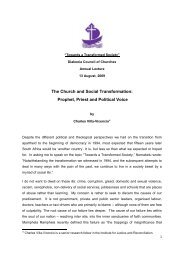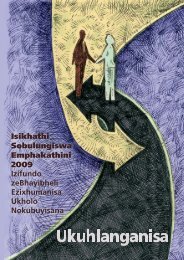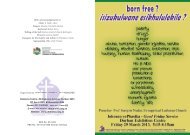The Role of the Church in Moral Renewal - Diakonia Council of ...
The Role of the Church in Moral Renewal - Diakonia Council of ...
The Role of the Church in Moral Renewal - Diakonia Council of ...
Create successful ePaper yourself
Turn your PDF publications into a flip-book with our unique Google optimized e-Paper software.
<strong>The</strong> <strong>Role</strong> <strong>of</strong> <strong>the</strong> <strong>Church</strong> <strong>in</strong> <strong>Moral</strong> <strong>Renewal</strong><br />
Pr<strong>of</strong> Bonganjalo Goba<br />
23 June 2007<br />
(This paper was presented at <strong>the</strong> <strong>Diakonia</strong> <strong>Council</strong> <strong>of</strong> <strong>Church</strong>es<br />
Annual Meet<strong>in</strong>g on 23 June 2007.)<br />
It is a mammoth task to talk about <strong>the</strong> role <strong>of</strong> <strong>the</strong> church <strong>in</strong> our contemporary<br />
South African context for a variety <strong>of</strong> reasons:<br />
1) One <strong>of</strong> <strong>the</strong> reasons is that <strong>the</strong>re are different understand<strong>in</strong>gs <strong>of</strong> <strong>the</strong> church<br />
(ecclesiological) <strong>in</strong>formed by different <strong>the</strong>ological traditions, historical contexts,<br />
as well as practical considerations.<br />
2) <strong>The</strong> o<strong>the</strong>r serious difficulty is that <strong>the</strong> church exists <strong>in</strong> a dynamic<br />
environment confronted by numerous challenges – e.g. <strong>the</strong> conspiracy <strong>of</strong><br />
postmodernism/globalisation - creat<strong>in</strong>g a high level <strong>of</strong> uncerta<strong>in</strong>ty about<br />
traditional ways <strong>of</strong> know<strong>in</strong>g and do<strong>in</strong>g <strong>the</strong>ology – or what we have referred to <strong>in</strong><br />
<strong>the</strong> past as hermeneutics <strong>of</strong> suspicion.<br />
3) <strong>The</strong> o<strong>the</strong>r difficulty <strong>in</strong> our context is <strong>the</strong> decl<strong>in</strong>e <strong>of</strong> <strong>the</strong> ecumenical<br />
movement, characterized by fragmentation and <strong>the</strong> promotion <strong>of</strong> ecclesiological<br />
self-<strong>in</strong>terests <strong>of</strong> our denom<strong>in</strong>ations – promot<strong>in</strong>g <strong>the</strong> privatization <strong>of</strong> our faith. <strong>The</strong><br />
ecumenical imperative that <strong>in</strong>formed our prophetic stance as churches dur<strong>in</strong>g <strong>the</strong><br />
apar<strong>the</strong>id years has been lost or compromised.<br />
4) <strong>The</strong>re is a pervasive attitude <strong>of</strong> fear to be prophetic as well as <strong>the</strong><br />
tendency to shun critical self-exam<strong>in</strong>ation <strong>in</strong> our context by our churches<br />
because <strong>of</strong> political expediency or correctness.<br />
5) I am sure as members <strong>of</strong> this audience you will be able to share your<br />
reasons too, why talk<strong>in</strong>g about <strong>the</strong> role <strong>of</strong> <strong>the</strong> church is becom<strong>in</strong>g more difficult,<br />
<strong>in</strong> our context.<br />
Be that as it may, as serious and <strong>the</strong>ologically conscious members <strong>of</strong> <strong>the</strong><br />
churches we have no choice but to speak about <strong>the</strong> role <strong>of</strong> <strong>the</strong> church <strong>in</strong> our<br />
context. Thus, I believe, my <strong>in</strong>vitation to speak about “be<strong>in</strong>g <strong>the</strong> church <strong>in</strong> <strong>the</strong><br />
present South African context,” to explore <strong>the</strong> challenges as well as <strong>the</strong><br />
opportunities <strong>of</strong> be<strong>in</strong>g <strong>the</strong> church specifically <strong>in</strong> promot<strong>in</strong>g moral renewal.<br />
One <strong>of</strong> <strong>the</strong> resources I have found extremely relevant to our topic are essays by<br />
British <strong>the</strong>ologians: “On be<strong>in</strong>g <strong>the</strong> <strong>Church</strong>: Essays on <strong>the</strong> Christian Community”<br />
edited by Col<strong>in</strong> E.Gunton and Daniel W. Hardy (T. & T. Clark 1989). <strong>The</strong>se<br />
have encouraged me to reflect about my ecclesiology as I attempt to respond to<br />
this topic.
In my reflections <strong>in</strong> <strong>the</strong> past, <strong>in</strong> <strong>the</strong> black <strong>the</strong>ology movement as well as <strong>in</strong> <strong>the</strong><br />
development <strong>of</strong> contextual <strong>the</strong>ology, I have emphasized <strong>the</strong> idea <strong>of</strong> <strong>the</strong>ology as<br />
communal praxis <strong>in</strong> <strong>the</strong> struggle for liberation. I am still <strong>of</strong> <strong>the</strong> view that Christian<br />
faith is a communal response to God’s call to participate <strong>in</strong> <strong>the</strong> liberat<strong>in</strong>g life,<br />
death and resurrection <strong>of</strong> our Lord Jesus Christ. That this faith response has<br />
political, social and public dimensions. That this faith response is historical,<br />
eschatological, and liberat<strong>in</strong>g.<br />
Werner G. Jeanrand suggests that <strong>the</strong> communal Christian praxis has three<br />
dimensions.<br />
“<strong>The</strong> three dimensions <strong>of</strong> Christian faith praxis can be dist<strong>in</strong>guished, but<br />
should never be separated. <strong>The</strong> entire Christian community lives by<br />
proclaim<strong>in</strong>g God’s creative activity <strong>in</strong> history and especially <strong>in</strong> <strong>the</strong> story <strong>of</strong><br />
Jesus Christ, by celebrat<strong>in</strong>g God’s presence <strong>in</strong> this universe especially<br />
through but not only <strong>in</strong> <strong>the</strong> feast <strong>of</strong> <strong>the</strong> Eucharist, and by actively<br />
participat<strong>in</strong>g <strong>in</strong> <strong>the</strong> transformation <strong>of</strong> this world accord<strong>in</strong>g to God’s salvific<br />
plan. This threefold identity <strong>of</strong> <strong>the</strong> Christian community is an identity <strong>in</strong><br />
process.”<br />
I share this view, especially <strong>the</strong>se three dimensions particularly as <strong>the</strong>y <strong>in</strong>form<br />
and shape <strong>the</strong> ethical imperatives <strong>of</strong> be<strong>in</strong>g <strong>the</strong> church <strong>in</strong> <strong>the</strong> South African<br />
context. This suggests an evolv<strong>in</strong>g understand<strong>in</strong>g <strong>of</strong> our role <strong>in</strong> our moral<br />
responsibility as churches, but I will return to this issue when I focus specifically<br />
on <strong>the</strong> role <strong>of</strong> <strong>the</strong> church <strong>in</strong> <strong>the</strong> process <strong>of</strong> moral renewal.<br />
With this basic view <strong>of</strong> <strong>the</strong> church, I want to suggest that <strong>the</strong> church <strong>in</strong> South<br />
Africa over <strong>the</strong> years has made a significant contribution <strong>in</strong> <strong>the</strong> moral renewal <strong>of</strong><br />
our society. John de Gruchy <strong>in</strong> his book “<strong>The</strong> <strong>Church</strong> struggle <strong>in</strong> South Africa”<br />
traces <strong>the</strong> various expressions <strong>of</strong> <strong>the</strong> churches to exercises <strong>the</strong>ir ethical<br />
responsibility <strong>in</strong> <strong>the</strong> context <strong>of</strong> apar<strong>the</strong>id, focus<strong>in</strong>g on <strong>the</strong> historical context,<br />
apar<strong>the</strong>id and churches, grow<strong>in</strong>g political conflict, black renaissance, protest and<br />
challenge, and concludes by focus<strong>in</strong>g on <strong>the</strong> idea <strong>of</strong> <strong>the</strong> K<strong>in</strong>gdom <strong>of</strong> God <strong>in</strong><br />
South Africa.<br />
John de Gruchy makes a very pert<strong>in</strong>ent po<strong>in</strong>t relevant to our topic when he<br />
observes:<br />
“But <strong>the</strong> renewal is none<strong>the</strong>less a timely rem<strong>in</strong>der to <strong>the</strong> church <strong>in</strong> South<br />
Africa that its resources ultimately lie beyond itself. <strong>The</strong> struggle <strong>of</strong> <strong>the</strong><br />
church is impossible without <strong>the</strong> power <strong>of</strong> <strong>the</strong> Holy Spirit, for it is God<br />
alone who can liberate <strong>the</strong> church and equip it for its task. But God<br />
requires more than passivity. He requires obedient discipleship. Thus<br />
<strong>the</strong> struggle <strong>of</strong> <strong>the</strong> church requires a servanthood-spirituality.” (p.236)<br />
2
<strong>The</strong> churches have <strong>in</strong> many <strong>of</strong> <strong>the</strong>ir pronouncements on <strong>the</strong> South African<br />
context raised moral issues from a wide range <strong>of</strong> perspectives.<br />
For example, <strong>the</strong> <strong>Council</strong> <strong>of</strong> <strong>the</strong> Nederduitse Gereformeerde Kerk <strong>in</strong> 1915<br />
emphasized:<br />
“<strong>The</strong> church must, <strong>the</strong>refore, always recognize and teach that it is a<br />
Christian responsibility that law and order – <strong>in</strong> <strong>the</strong> state, as well as church<br />
and family life - be honoured and ma<strong>in</strong>ta<strong>in</strong>ed” (p.207 Villavicencio)<br />
As ano<strong>the</strong>r example, A Message to <strong>the</strong> People <strong>of</strong> South Africa 1968 makes <strong>the</strong><br />
follow<strong>in</strong>g observation:<br />
“We believe that this doctr<strong>in</strong>e <strong>of</strong> separation is a false faith, a novel gospel:<br />
it <strong>in</strong>evitably is <strong>in</strong> conflict with <strong>the</strong> gospel <strong>of</strong> Jesus Christ, which <strong>of</strong>fers<br />
salvation.” (P.214)<br />
Ano<strong>the</strong>r example is <strong>the</strong> pronouncement on Div<strong>in</strong>e or Civil Obedience 1973:<br />
“When <strong>the</strong> Government deviates from <strong>the</strong> Gospel, <strong>the</strong> Christian is bound<br />
by his conscience to resist it. Even if this results <strong>in</strong> break<strong>in</strong>g <strong>the</strong> law, it<br />
has to be done because God’s law will be ma<strong>in</strong>ta<strong>in</strong>ed above <strong>the</strong> law <strong>of</strong><br />
man (Acts 4)” (p.220)<br />
Also, <strong>the</strong> NG Mission <strong>Church</strong> <strong>in</strong> “Confessions <strong>of</strong> Faith” 1982, makes <strong>the</strong> follow<strong>in</strong>g<br />
statement:<br />
“We declare that Apar<strong>the</strong>id (separate development) is a s<strong>in</strong>, that <strong>the</strong> moral<br />
and <strong>the</strong>ological justification <strong>of</strong> it makes a mockery <strong>of</strong> <strong>the</strong> gospel, and that<br />
its consistent disobedience to <strong>the</strong> word <strong>of</strong> God is a <strong>the</strong>ological heresy.”<br />
([p. 241)<br />
I cite <strong>the</strong>se examples to demonstrate that churches over <strong>the</strong> years have raised<br />
ethical issues <strong>in</strong> <strong>the</strong>ir efforts to promote moral renewal <strong>in</strong> <strong>the</strong> South African<br />
context. For those <strong>of</strong> you who would like to review <strong>the</strong>se statements, I<br />
encourage you to read Charles Villavicencio’s book “Between Christ and Caesar,<br />
Classic and Contemporary Texts on <strong>Church</strong> and State” (David Phillip 1986).<br />
So <strong>the</strong> <strong>Church</strong> has always been challenged to exercise its moral responsibility <strong>in</strong><br />
different contexts. But <strong>the</strong> critical issue we have to discuss today is, what is that<br />
role <strong>in</strong> our particular context, hence <strong>the</strong> topic “<strong>The</strong> <strong>Role</strong> <strong>of</strong> <strong>the</strong> <strong>Church</strong> <strong>in</strong> <strong>Moral</strong><br />
<strong>Renewal</strong>.”<br />
One <strong>of</strong> <strong>the</strong> def<strong>in</strong>itions I have found useful <strong>in</strong> help<strong>in</strong>g us to focus on <strong>the</strong> ethical<br />
responsibility <strong>of</strong> <strong>the</strong> church is <strong>the</strong> one <strong>of</strong>fered by Pr<strong>of</strong>essor James Burtchaell: as<br />
he puts it:<br />
3
“<strong>The</strong> <strong>Church</strong> is a community <strong>of</strong> moral wisdom, accumulated, passed on,<br />
challenged and revised.” (From”Christ to <strong>the</strong> World” p.65)”<br />
I like this def<strong>in</strong>ition, because from an African <strong>the</strong>ological perspective moral<br />
wisdom embraces certa<strong>in</strong> virtues (e.g. <strong>of</strong> ubuntu, collective responsibility) which<br />
constitute or are responsible for character formation. <strong>The</strong>y def<strong>in</strong>e our identity.<br />
In an essay which is a chapter <strong>in</strong> <strong>the</strong> book edited by Mongezi Guma and Leslie<br />
Milton ”An African Challenge to <strong>the</strong> <strong>Church</strong> <strong>in</strong> <strong>the</strong> 21 st Century”, I refer you to <strong>the</strong><br />
essay “Choos<strong>in</strong>g who we are: a Christian perspective on <strong>the</strong> moral crisis<br />
confront<strong>in</strong>g <strong>the</strong> South African context.” Let me quote from that essay:<br />
“Choos<strong>in</strong>g who we are <strong>in</strong> <strong>the</strong> new South African context poses a serious<br />
hermeneutical challenge for <strong>the</strong> churches as <strong>the</strong>y review and revisit <strong>the</strong>ir<br />
mission mandate and moral responsibility.” (p.68)<br />
My position has not changed s<strong>in</strong>ce <strong>the</strong> publication <strong>of</strong> that essay. I am still <strong>of</strong> <strong>the</strong><br />
view that churches as communities <strong>of</strong> moral wisdom play a very crucial role<br />
assist<strong>in</strong>g us <strong>in</strong>dividually and collectively to choose who we are as we seek to be<br />
faithful to <strong>the</strong> imperative <strong>of</strong> <strong>the</strong> gospel. I want to suggest that this moral wisdom<br />
which is embodied <strong>in</strong> <strong>the</strong> mission mandate <strong>of</strong> <strong>the</strong> church seeks to promote those<br />
Christian virtues, practices, narratives, traditions that shape our identity as<br />
responsible moral be<strong>in</strong>gs. I go back to <strong>the</strong> observations made by Werner<br />
Jeanrond <strong>of</strong> <strong>the</strong> threefold dimension <strong>of</strong> <strong>the</strong> Christian faith praxis.<br />
<strong>The</strong> church as a community <strong>of</strong> moral wisdom proclaims God’s liberat<strong>in</strong>g activity<br />
by challeng<strong>in</strong>g and expos<strong>in</strong>g <strong>the</strong> prevail<strong>in</strong>g moral decay <strong>in</strong> society. <strong>The</strong> church<br />
as a community <strong>of</strong> moral wisdom through its prophetic witness becomes <strong>the</strong><br />
voice <strong>of</strong> <strong>the</strong> voiceless. Through its activities and practices, <strong>the</strong> church promotes<br />
a vision <strong>of</strong> just moral order. From this perspective, <strong>the</strong> local congregation<br />
becomes <strong>the</strong> site for critical moral discourse as current issues <strong>of</strong> <strong>the</strong> day are<br />
discussed by members <strong>of</strong> <strong>the</strong> church (teach<strong>in</strong>g m<strong>in</strong>istry <strong>of</strong> <strong>the</strong> local church.)<br />
<strong>The</strong> church as a community <strong>of</strong> moral wisdom plays an important role <strong>in</strong> <strong>the</strong><br />
promotion <strong>of</strong> virtues and shap<strong>in</strong>g <strong>of</strong> character through reclaim<strong>in</strong>g <strong>the</strong> resources<br />
<strong>of</strong> our faith, e.g. <strong>the</strong> scriptures, worship, spiritual discipl<strong>in</strong>es and active social<br />
service. In this regard, my own perspective has been <strong>in</strong>fluenced by Stanley<br />
Havermas, John Yoder and especially by African traditional wisdom (African<br />
Proverbs).<br />
I believe <strong>the</strong> church as a community <strong>of</strong> moral wisdom, particularly as<br />
accumulated wisdom, poses a hermeneutical challenge. One <strong>of</strong> <strong>the</strong> unresolved<br />
issues that we need to revisit is our mission mandate, through re-read<strong>in</strong>g <strong>of</strong> <strong>the</strong><br />
scriptures <strong>in</strong> our context. This entails grappl<strong>in</strong>g with <strong>the</strong> resources <strong>of</strong> our faith as<br />
we engage with contemporary moral issues. Our sem<strong>in</strong>aries/universities do not<br />
4
prepare us very well to engage <strong>in</strong> this work. As we grapple with <strong>the</strong>se issues <strong>of</strong><br />
<strong>the</strong> day, we need critical biblical reflection as well as deep understand<strong>in</strong>g <strong>of</strong><br />
those African moral values that constitute what I want to call African moral<br />
wisdom.<br />
<strong>The</strong> o<strong>the</strong>r critical issue confront<strong>in</strong>g <strong>the</strong> church as a community <strong>of</strong> moral wisdom<br />
is to provide leadership by focus<strong>in</strong>g on those press<strong>in</strong>g issues confront<strong>in</strong>g society<br />
today. Let me mention some <strong>of</strong> <strong>the</strong>se issues. <strong>The</strong>re is no doubt <strong>in</strong> my m<strong>in</strong>d<br />
that, despite our new democratic dispensation, we cont<strong>in</strong>ue to confront poverty,<br />
<strong>the</strong> HIV/AIDS pandemic, racism,, domestic violence, crime, unemployment,<br />
corruption, avarice/greed, issues related to homosexuality/ same sex marriage,<br />
land issues, poor hous<strong>in</strong>g, <strong>in</strong>adequate health care and an <strong>in</strong>adequate<br />
educational system. <strong>The</strong>se issues demand <strong>the</strong> attention <strong>of</strong> <strong>the</strong> church as we<br />
strive to build a just and car<strong>in</strong>g society. <strong>The</strong>se issues demand our response<br />
<strong>in</strong>formed by <strong>the</strong> resources <strong>of</strong> our faith.<br />
I believe I need to state what I understand by morality. For me, morality is a way<br />
<strong>of</strong> life based on patterns <strong>of</strong> behaviour, values, standards and beliefs about what<br />
is good and right <strong>in</strong>formed by <strong>the</strong> resources <strong>of</strong> my Christian faith. However, this<br />
understand<strong>in</strong>g <strong>of</strong> morality is a way <strong>of</strong> be<strong>in</strong>g <strong>in</strong> <strong>the</strong> world with special focus on a<br />
worthy life, or a life well used, to be emulated and shared with o<strong>the</strong>rs. This way<br />
<strong>of</strong> life <strong>in</strong>forms my moral identity. This understand<strong>in</strong>g <strong>of</strong> morality is nurtured<br />
with<strong>in</strong> <strong>the</strong> Christian community, hence my emphasis on character formation and<br />
<strong>the</strong> significance <strong>of</strong> moral virtues, such as patience, humility, hope, courage,<br />
gratitude, peace, contrition, joy, self-control, patience, perseverance,<br />
compassion, gentleness, generosity, faithfulness, forbearance. I am sure you<br />
can add more virtues as members <strong>of</strong> this audience.<br />
One <strong>of</strong> <strong>the</strong> challenges confront<strong>in</strong>g <strong>the</strong> churches <strong>in</strong> our context is to promote<br />
<strong>the</strong>se virtues through <strong>the</strong> teach<strong>in</strong>gs, worship and spiritual discipl<strong>in</strong>es <strong>of</strong> <strong>the</strong><br />
church. It poses a serious challenge for churches to put <strong>the</strong>ir houses <strong>in</strong> order.<br />
For, as we exam<strong>in</strong>e <strong>the</strong> current role <strong>of</strong> <strong>the</strong> churches, <strong>the</strong>re is more to be done.<br />
As a local pastor, I know we are not do<strong>in</strong>g much to promote moral renewal.<br />
<strong>The</strong> focus is on ma<strong>in</strong>ta<strong>in</strong><strong>in</strong>g <strong>the</strong> status quo, <strong>of</strong> not challeng<strong>in</strong>g even <strong>the</strong><br />
contradictions that prevail at <strong>the</strong> moment.<br />
As I th<strong>in</strong>k about <strong>the</strong> role <strong>of</strong> <strong>the</strong> church, I am rem<strong>in</strong>ded <strong>of</strong> <strong>the</strong> observations which<br />
Dietrich Bonhoeffer made about <strong>the</strong> churches <strong>of</strong> his day:<br />
“<strong>The</strong> church confesses that she has not proclaimed <strong>of</strong>ten and clearly her<br />
message <strong>of</strong> one God who has revealed Himself for all times <strong>in</strong> Jesus<br />
Christ and who suffers no o<strong>the</strong>r gods beside Himself. She confesses her<br />
timidity, her evasiveness and her dangerous concessions. She has <strong>of</strong>ten<br />
been untrue to her <strong>of</strong>fice <strong>of</strong> guardianship and to her <strong>of</strong>fice <strong>of</strong> comfort.<br />
And through this, she has <strong>of</strong>ten denied to <strong>the</strong> outcast and to <strong>the</strong> despised<br />
<strong>the</strong> compassion which she owes <strong>the</strong>m. She was silent when she should<br />
5
have cried out because <strong>the</strong> blood <strong>of</strong> <strong>the</strong> <strong>in</strong>nocent was cry<strong>in</strong>g aloud to<br />
heaven.” (p.113)<br />
<strong>The</strong>se words come from Bonhoeffer’s focus on what he refers to as “Ethics <strong>of</strong><br />
formation”.<br />
Let me propose some practical steps for <strong>the</strong> churches to reclaim, revive, revisit<br />
<strong>the</strong>ir understand<strong>in</strong>g as a community <strong>of</strong> moral wisdom.<br />
(1)<br />
I have already alluded to <strong>the</strong> fact that <strong>the</strong> church (es) must put <strong>the</strong>ir house <strong>in</strong><br />
order. Today as churches, we reflect fragmentation, spiritual fatigue, and lack <strong>of</strong><br />
zeal for prophetic social action. <strong>The</strong> ecumenical commitment is no longer a<br />
serious matter <strong>in</strong>formed by our mission mandate.<br />
Michael K<strong>in</strong>namon <strong>in</strong> his timely book “<strong>The</strong> Vision <strong>of</strong> <strong>the</strong> Ecumenical Movement<br />
and how it has been impoverished by its Friends” makes <strong>the</strong> follow<strong>in</strong>g<br />
observation:<br />
“<strong>The</strong> s<strong>in</strong>gle biggest problem fac<strong>in</strong>g <strong>the</strong> ecumenical movement (and <strong>the</strong><br />
WCC) <strong>in</strong> my judgment is a widespread failure to grasp and teach <strong>the</strong><br />
biblically based vision <strong>of</strong> <strong>the</strong> church and its relationship to <strong>the</strong> world that<br />
gave energy and direction to ecumenical work throughout most <strong>of</strong> <strong>the</strong><br />
twentieth century. ... This vision has been domesticated by <strong>the</strong><br />
churches <strong>in</strong>volved <strong>in</strong> <strong>the</strong> movement, impoverished by those <strong>of</strong> us who are<br />
ostensibly its support.” (p.2)<br />
I believe if churches are to provide leadership <strong>in</strong> <strong>the</strong> process <strong>of</strong> moral renewal,<br />
<strong>the</strong>y must rediscover, reclaim <strong>the</strong>ir ecumenical vision. <strong>Moral</strong> renewal is a huge<br />
undertak<strong>in</strong>g that demands shared commitment, shared resources and an<br />
ongo<strong>in</strong>g commitment, a seek<strong>in</strong>g our unity “that <strong>the</strong> world may believe” John<br />
17:21 What I am suggest<strong>in</strong>g is that moral renewal is an ecumenical project<br />
which God is call<strong>in</strong>g churches to undertake <strong>in</strong> our context. This requires a<br />
serious commitment to establish an ongo<strong>in</strong>g committee, group or <strong>in</strong>itiative with<strong>in</strong><br />
<strong>Diakonia</strong> to focus on develop<strong>in</strong>g a creative, relevant programme <strong>of</strong> moral renewal<br />
amongst its member churches <strong>in</strong> our context.<br />
(2)<br />
To go back to a po<strong>in</strong>t I referred to earlier, <strong>the</strong> local church, as an expression <strong>of</strong><br />
moral wisdom, is <strong>the</strong> site for moral renewal <strong>in</strong> every aspect <strong>of</strong> its activities.<br />
We need to revive <strong>the</strong> teach<strong>in</strong>g m<strong>in</strong>istry <strong>of</strong> <strong>the</strong> local church by a special focus on<br />
bible study and spiritual discipl<strong>in</strong>es that seek to enhance our moral vigilance. As<br />
a pastor <strong>of</strong> a local church <strong>in</strong> <strong>the</strong> Durban North area, I am challenged <strong>in</strong> my<br />
6
sermons to focus on moral issues <strong>of</strong> <strong>the</strong> day <strong>in</strong> response to <strong>the</strong> imperatives <strong>of</strong> <strong>the</strong><br />
gospel.<br />
I have also stated that this is a leadership issue for our churches. One <strong>of</strong> <strong>the</strong><br />
excit<strong>in</strong>g projects <strong>of</strong> my church is <strong>the</strong> establishment <strong>of</strong> <strong>the</strong> Leadership Academy<br />
with full-time staff, designed to revive and promote <strong>the</strong> teach<strong>in</strong>g m<strong>in</strong>istry <strong>of</strong> <strong>the</strong><br />
church. I am very excited about this because s<strong>in</strong>ce retirement from higher<br />
education I have established a Centre for African Leadership Development which<br />
will be launched next month.<br />
(3)<br />
One <strong>of</strong> <strong>the</strong> ongo<strong>in</strong>g challenges <strong>of</strong> churches <strong>in</strong> our society is <strong>the</strong>ir prophetic role.<br />
As communities <strong>of</strong> moral wisdom, <strong>the</strong> task is to promote and build a just and<br />
car<strong>in</strong>g society.<br />
This has serious implications for <strong>the</strong> churches <strong>in</strong> that <strong>the</strong>y become <strong>the</strong> voice <strong>of</strong><br />
<strong>the</strong> voiceless. <strong>The</strong>y have a serious advocacy role. <strong>Church</strong>es more than before<br />
are called to <strong>in</strong>terrogate government policies that have a great impact on <strong>the</strong><br />
lives <strong>of</strong> <strong>the</strong> people. This calls for ethical analysis <strong>of</strong> social issues and problems.<br />
<strong>The</strong> challenge here is for churches to <strong>in</strong>terrogate <strong>the</strong> prevail<strong>in</strong>g policies,<br />
dom<strong>in</strong>ant cultural values and <strong>in</strong>stitutional power structures.<br />
Here aga<strong>in</strong>, <strong>Diakonia</strong> has a greater role to play as it br<strong>in</strong>gs toge<strong>the</strong>r secular<br />
scholars, <strong>the</strong>ologians, political activists, church leaders to reflect on current<br />
policies and provide ongo<strong>in</strong>g <strong>in</strong>formation to our members <strong>in</strong> our local churches.<br />
As we engage <strong>in</strong> this work, we become catalysts, prodd<strong>in</strong>g and challeng<strong>in</strong>g all<br />
about what k<strong>in</strong>d <strong>of</strong> society we want to become.<br />
(4)<br />
<strong>The</strong> church becomes a community <strong>of</strong> moral wisdom through <strong>the</strong> process <strong>of</strong><br />
character formation and ongo<strong>in</strong>g moral discernment <strong>in</strong> response to <strong>the</strong><br />
imperatives <strong>of</strong> <strong>the</strong> gospel. This role on <strong>the</strong> part <strong>of</strong> <strong>the</strong> church becomes more<br />
visible and relevant as it assumes its prophetic role, by reclaim<strong>in</strong>g its ecumenical<br />
vision, focus<strong>in</strong>g on <strong>the</strong> teach<strong>in</strong>g m<strong>in</strong>istry <strong>of</strong> <strong>the</strong> local church, becom<strong>in</strong>g <strong>the</strong> voice<br />
<strong>of</strong> <strong>the</strong> voiceless. From this perspective, I believe <strong>the</strong> ultimate goal is do<strong>in</strong>g<br />
God’s justice as we build a just and a car<strong>in</strong>g society.<br />
I believe this is a mammoth task on <strong>the</strong> part <strong>of</strong> churches because it <strong>in</strong>volves a<br />
process <strong>of</strong> critical self-exam<strong>in</strong>ation, or what Cornell West refers to as track<strong>in</strong>g<br />
hypocrisy <strong>in</strong> ourselves and o<strong>the</strong>rs as we exercise our prophetic role <strong>in</strong> society.<br />
Track<strong>in</strong>g hypocrisy <strong>in</strong> <strong>the</strong> South African context, I believe, is what <strong>the</strong> church as a<br />
community <strong>of</strong> moral wisdom should be about.<br />
7
Let me conclude my remarks by thank<strong>in</strong>g <strong>Diakonia</strong> for this opportunity to reflect<br />
on this important topic as a means <strong>of</strong> promot<strong>in</strong>g ongo<strong>in</strong>g discussion and<br />
dialogue. Trust<strong>in</strong>g that <strong>the</strong>re will be more opportunities for us to revisit this topic<br />
especially <strong>in</strong> <strong>the</strong> context <strong>of</strong> <strong>the</strong> real issues we confront every day.<br />
I have been <strong>in</strong>spired by <strong>the</strong> prophets and St Paul <strong>in</strong> my moral journey, so let me<br />
share two important read<strong>in</strong>gs that have been formative <strong>in</strong> my m<strong>in</strong>istry over <strong>the</strong><br />
years.<br />
Micah 6:8 He has told you, O mortal, what is good; and what does <strong>the</strong><br />
Lord require <strong>of</strong> you but to do justice, and love k<strong>in</strong>dness and walk humbly with<br />
your God?<br />
1 Peter 3:13-15: Now who will harm you if you are eager to do what is good?<br />
But even if you suffer for do<strong>in</strong>g what is right, you are blessed. Do not fear<br />
what <strong>the</strong>y fear and do not be <strong>in</strong>timidated but <strong>in</strong> your hearts sanctify Christ as<br />
Lord. Always be ready to make your defense to anyone who demands from you<br />
an account<strong>in</strong>g for <strong>the</strong> hope that is <strong>in</strong> you.<br />
References<br />
Bonhoeffer D (1933)<br />
Ethics Collier Books,<br />
Macmillan Publish<strong>in</strong>g Company, New York.<br />
Boulton W.G, Kennedy T.D., Verhey A. (1994)<br />
From Christ to <strong>the</strong> World: Introductory Read<strong>in</strong>gs <strong>in</strong><br />
Christian Ethics<br />
Wm B. Eerdmans Publish<strong>in</strong>g Co. Grand Rapids,<br />
Michegan.<br />
De Gruchy J (1979)<br />
<strong>The</strong> <strong>Church</strong> Struggle <strong>in</strong> South Africa<br />
Guma M, Mitton L, Eds<br />
An African Challenge to <strong>the</strong> <strong>Church</strong> <strong>in</strong> <strong>the</strong><br />
Twenty-First Century<br />
Salty Pr<strong>in</strong>t, Cape Town.<br />
Gunton C and Hardy W (1989)<br />
On Be<strong>in</strong>g <strong>the</strong> <strong>Church</strong>: Essays on <strong>the</strong> Christian Community<br />
T. & T. Clark, Ed<strong>in</strong>burgh.<br />
K<strong>in</strong>namon M (2003)<br />
<strong>The</strong> Vision <strong>of</strong> <strong>the</strong> Ecumenical Movement and how it has<br />
been impoverished by its Friends<br />
Chalice Press, St Louis, Misssouri.<br />
McColhough T (1991)<br />
<strong>The</strong> <strong>Moral</strong> Imag<strong>in</strong>ation and Public Life: Rais<strong>in</strong>g <strong>the</strong><br />
Ethical Questions<br />
Chatham House Publishers Inc., Chatham, NJ.<br />
8
M.K, Kallenberg B, Murphy N, Eds (1997)<br />
Virtues and Practices <strong>in</strong> Christian Tradition: Christian Ethics after<br />
MacIntyre<br />
Tr<strong>in</strong>ity Press International, Harrisburg, Pa.<br />
Villavicenceo C, Pityana B, Eds (1995)<br />
Be<strong>in</strong>g <strong>the</strong> <strong>Church</strong> <strong>in</strong> South Africa today<br />
Salty Pr<strong>in</strong>t, Cape Town.<br />
Villavicenceo C (1986)<br />
Between Christ and Caesar: Classic and Contemporary<br />
Texts on <strong>Church</strong> and State<br />
West C (1993)<br />
Beyond Eurocentrism and Multiculturalism Vol. 1:<br />
Prophetic Thought <strong>in</strong> Postmodern Times<br />
Common Courage Press.<br />
This paper presented at <strong>the</strong> <strong>Diakonia</strong> <strong>Council</strong> <strong>of</strong> <strong>Church</strong>es Annual Meet<strong>in</strong>g<br />
on 23 June 2007<br />
For additional resources, go to www.diakonia.org.za<br />
9


